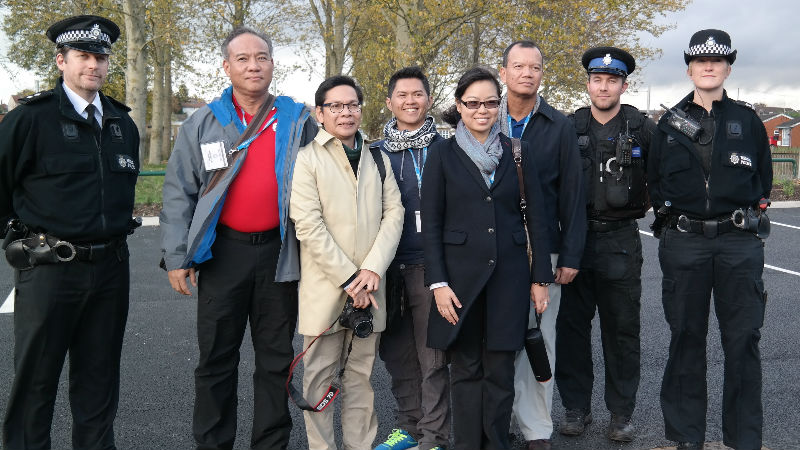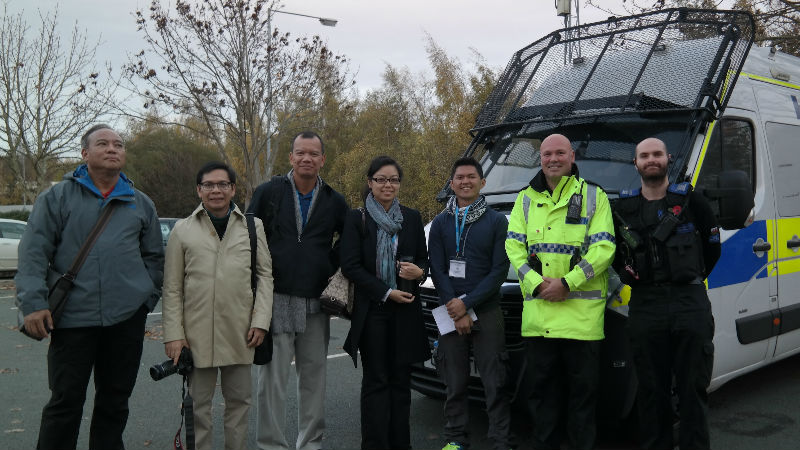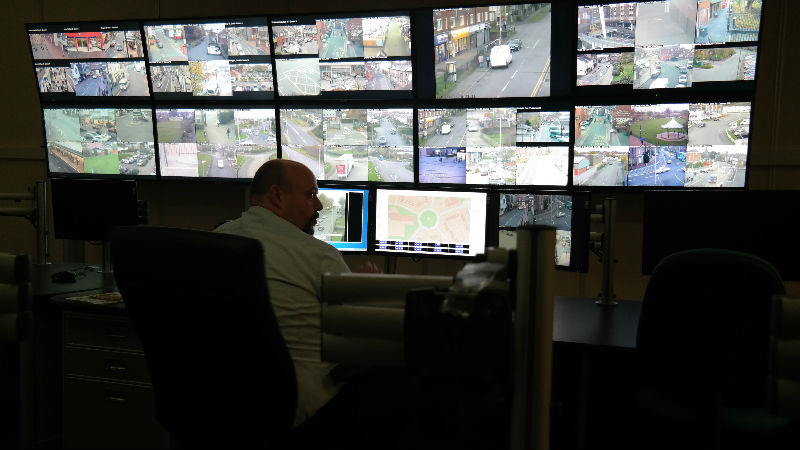PH law enforcers look at UK model for Bangsamoro police

North Wales Police officers listen to a briefing on the British Council-sponsored community policing project for the Bangsamoro autonomous region in Mindanao. The British Council brought a 12-member study group to learn from the successful community policing record of the North Wales police. Photos by Juliet Labog-Javellana
(First of two parts)
NORTH WALES, United Kingdom—Philippine law enforcement officials looking to find a model for the future Bangsamoro traveled thousands of kilometers to this part of Great Britain and found a police system that was to die for.
The British Council took a 12-member study group on a weeklong immersion with the North Wales Police last month. The group was tasked with producing a “community policing” blueprint or tool kit that could be applied to the Bangsamoro or elsewhere in the Philippines.
The proposed Bangsamoro Basic Law (BBL), still pending in Congress as the sun sets on the Aquino administration, provides for the adoption of community policing as an “essential mechanism” for peace and order in the proposed Muslim autonomous region.
“Their detention centers are even better than our police stations,” Anwar Malang, regional secretary of the Department of the Interior and Local Government (DILG) in the Autonomous Region in Muslim Mindanao (ARMM), said after a tour of the custody suites at the divisional headquarters in St. Asaph City.
The suites have cots and urinals, and are watched with security cameras and remote pulse monitors. Detainees are served ready-to-eat meals (which include choices for meat eaters and vegetarians) and have access to hygiene and health services.
Police mindset
But more than the facilities, it was the police mindset here that impressed the group.
The British police consider offenders “customers” to be treated with respect, according to Insp. Paul Roberts, who took the Philippine group on a tour of the detention center.
This philosophy was evident in the physical setup of the station, which had a reception desk you would mistake for that of a corporate office rather than a jail facility. The only thing that gave away the purpose of the place was a circular platform behind the reception desk with security cameras showing each detention suite.

The central command in Wrexham where emergency calls are received and dispatched for action by the North Wales police. Juliet Labog-Javellana
“It’s all about giving people dignity and decency. Everything we do here is to look after them so that when they leave, they leave in one piece,” Roberts said.
Apart from First World headquarters, cutting-edge technology and Mercedes Benzes for police cars, the group found a community-oriented police force which focuses on crime reduction and prevention, and operates on the principle of “policing by consent” of the public.
Knowing the community
From police officers teaching subjects like substance abuse in primary schools, installing safety devices on houses and properties, organizing summer camps for restless kids, rehabilitating the community’s “Top 20” troublemakers or tracking lost horses, the North Wales police showed that knowing your community was key to an effective and trusted police force.
The Philippine group, composed of police and military officials, toured the headquarters in Colwyn Bay, Wrexham, Flintshire, Mold and Deeside, and joined foot patrols to see the North Wales police in action. The tour included a visit to the Airbus plant in Broughton to see how a single police officer contributes to peacekeeping in the giant aircraft wing factory.
They also visited a massive central command in Wrexham, where emergency calls are received and where various parts and establishments are monitored by high-definition security cameras. Here, the Philippine group saw how a duty officer can control the CCTV cameras to focus on a street, an establishment or a person of interest. Shops have radios to alert the police about shoplifting, riots or other untoward incidents. From the control room, the police can track down the offenders and make arrests.
Another showcase was Caia Park in the same town, an impoverished community previously torn by racial tensions and crime but has now been transformed into a model community, and where the police perform not only law enforcement but also social work.
The group met with the North Wales police head, Chief Constable Mark Polin, and Police and Crime Commissioner Winston Roddick, the elected overseer of the force.
With a 1,500-strong force and 250 police community support officers (PCSOs), the North Wales police serves an area slightly bigger than Brunei, with a population of around 687,000 (2011 census).
Its jurisdiction includes Anglesey, where Prince William once served as a rescue pilot for the Royal Air Force and where he and his wife, Kate Middleton, Duchess of Cambridge, lived in a secluded farmhouse following their marriage.

Members of the Philippine study group pose with the North Wales police after visiting Caia Park, a former conflict area now transformed into a model community with the help of the police.
The North Wales police, through its uniformed civilian members called PCSOs, work closely with communities through partnerships with residents, schools, businesses, hospitals and organizations to secure their neighborhoods and focus on crime prevention. Their collective theme is “A safer North Wales.’’
High standards
Philip Thomson, British Council consultant and project team leader, said the place was chosen because of its high standard of community policing. It topped the latest 2015 crime survey for England and Wales, getting the best rating for respect from the public, fair treatment and most-improved in preventing crime.
A former police commander in the area, Thomson said North Wales, a mix of rural and urban areas, bilingual (English and Welsh) and had a history of conflict, approximated conditions in the proposed Bangsamoro.
An hour’s drive from Manchester, North Wales—dotted with picturesque mountains and valleys, and a vast coastline—thrives principally on tourism and has the lowest per capita income in the United Kingdom.
Engagement with communities is a mandate for the force, Polin told the Philippine group. He said the police maintained close relations with community groups, schools, businesses and organizations and attended public forums and local council meetings to know their problems.
“To ensure that our service is at the highest, we measure public satisfaction regularly,” Polin said, adding that the police commission private and internal public opinion surveys. The surveys found a high rating of up to 90 percent for the police.
Force ground rules
The North Wales police live by six “force ground rules” that reflect their values as a team:
We will treat everyone fairly.
We will treat everyone with respect.
We will support each other.
What we do matters.
What we say matters.
How we look matters.
“Failing to treat people with respect can lead to prejudiced and preconceived views, which in turn leads to unfair treatment,’’ Polin said. “A good reflective measure is…Do you treat people as you would expect to be treated yourself?’’
Polin said that since many people in North Wales will have no interaction with the police, their public image is of utmost importance.

Members of the Philippine study group ready for an immersion with the North Wales police on how they do community and neighborhood policing successfully.
“Their opinions of us will be shaped by what they read or hear. What we say and how we say it is a vital part of police `visibility’ and has an effect on public confidence and our credibility,’’ Polin said.
Polin said how the police interact with the public leaves a lasting impression. Thus the North Wales police even take pride in its standard of uniform and equipment, which is said to be “second to none’’.
According to Insp. Owain Llewellyn, in charge of neighborhood policing, they attend hundreds of local council meetings to identify priorities, go to schools to warn children whenever there is a new drug in circulation, and go to repeat victims of crimes to teach them how to secure their premises.
“A lot of them is prevention rather than enforcement. Crime incidents go down and satisfaction [on police performance] goes up,” Llewellyn said.
Llewellyn said that by listening to people’s problems about their safety and wellbeing, they get the public’s trust and confidence.
They got the community down to a “T” by identifying the “Top 20” individuals who pose the most challenge to the police.
Deputy Chief Constable Gareth Pritchard said his men observed high standards of recruitment and accountability, such that 28 members were removed in the past two years for infractions of honesty and integrity rules.
“We make sure that our actions are understandable and acceptable to the communities. What we do is aligned to what the communities need,’’ Pritchard said.
Assistant Chief Constable Richard Debicki said their community policing was rooted in the maxim of its founder: `The police are the public and the public are the police.’
“Trust and confidence is really significant. We rely on the public for information so we can do our work effectively if we had the trust of the public. Policing by consent allows us to do our work effectively,’’ Debicki said.
Partly in response to austerity measures, North Wales police has PCSOs to increase police visibility and engagement with communities.
PCSOs, uniformed civilian members of the police force, don’t carry firearms and have no arrest powers but conduct foot patrols, handle anti-social behavior and minor misdemeanors. Their plus factor is their familiarity with the community since they usually come from the area and speak the language.
The Philippine delegation met Police Constables John Wheway and Mannon Williams, who are in charge of the All-Wales School Liaison Project here in North Wales.

A CCTV control room in Wrexham town has high-definition cameras that monitor every part of town. The duty officer can focus the cameras on any street, establishment or person of interest. Shops have radios to alert the police when there are shoplifting, riots, missing children or any untoward incidents. The CCTVs help track down the offenders and enable the police to make instant arrests.
The unique program involves community police officers teaching primary and secondary school children subjects on drugs and substance misuse, anti-social behavior and personal safety.
All 454 schools in Wales include the police lesson matrix in their curriculum. The program produces information materials on a wide range of safety issues from drug abuse to cyberbullying and internet safety.
Wheway, who has become a regular fixture in school and is fondly called “PC John’’ by the students, said that the program allowed the children to understand and appreciate the role of the police in keeping them and their communities safe.
“Kids are scared of the police so continuity is important. The only way this (program) will work is if you have a partnership with police and educational and social service authorities,’’ Wheway said.
Mannon said that through the program, the police teach young students good citizenship and prevents them from becoming crime offenders.
Securing communities
In Wrexham town, the Philippine group was impressed by how the police went to great lengths to secure the communities.
Sgt. Sue Richards and Andy Watkin presented an array of “crime packs,” such as door jammers, security cameras and alarms that they can lend to residents in need of better protection for their homes. People going on vacation can trust the police to look after their homes, and even to regularly check on elderly people living alone.
“If they are on vacation or in the hospital, we get information on how many cars are left in their garage, whether their curtains are drawn or who got the keys,” Richards said, adding they had visited every house in the community.
To prevent unscrupulous people from taking advantage of elderly residents, the police have designated residential communities as “No Cold Calling” areas, or where soliciting or selling by phone or door-to-door is banned.
The police also provide DNA forensic markers for bikes to prevent theft and make recovery easier. Since bikes (many of them expensive) are popular in these parts, the police go to community events to have free bike registration and DNA marking, Richards said. They even have horse patrols to search for lost horses.
The police also perform community intervention and social work. In Caia Park, which was previously torn by drug abuse and riots between locals and immigrants, the police work closely with the local housing and community officers to enforce peace and order, and support livelihood and sports activities for the young.
To keep the peace, they can evict troublemakers from the government housing under the anti-social behavior law enacted in 2014. Parents who neglect their children are warned they could lose custody.
For children of poor families or top offenders, the police even provide lunch money.
In the small village of Treuddyn in Flintshire, PCSO Poppy Jones initiated the “Treuddyn’s Sorted’’, a police summer program intended to reduce anti-social behavior among children. Noting how the children in the community (of about 1,500 people) tend to be involved in fights and unproductive pursuits during school breaks, she partnered with schools to promote many summer activities like water sports, arts and crafts and even wildlife appreciation.
“We set the activities on the same date every summer so the kids know what to expect and they can just go when they like to,’’ Jones said. Her program, which has brought about a big reduction of anti-social behavior among the youth, has become a model to be replicated elsewhere.
An inspiring example is that of a PCSO in Deeside town, who had been handling some of the “Top 20’’ in their community – people who create the most trouble for the police and welfare agencies.
One of the families involved a couple who were drug users and who could not take care of their children. One daughter had been caught shoplifting a number of times, although unlike her parents she had not been monitored for drug use.
The PCSO spent many hours visiting and reaching out to her. Her patience bore fruit when one day, the daughter opened up to her. She told the police officer that she gives her government benefit money to her mother so she could buy her drugs, and she shoplifts for her and her little child’s needs.
For the underprivileged people, the North Wales police perform social work by tapping private sector partners to provide for their needs.
Supt. Nige Harrison said crime profiles have changed in the past few years. From physical crimes like theft or break-ins, the police are now dealing with sophisticated crimes such as online fraud, cybercrimes and child exploitation.

Members of the Philippine study group take a break from the weeklong immersion with the North Wales police.
To meet these new challenges, the North Wales police also tap citizen volunteers to support the police in information gathering and reporting of crimes, he said.
The North Wales police also use social media to engage with the community and increase their “visibility.”
The study tour was part of the community policing project for the Bangsamoro in Mindanao funded by the British Council, the UK’s international organization for cultural relations.
Thomson, project team leader, said they have completed consultations with some 30 communities and 23,000 people in the Bangsamoro area in Mindanao as part of the project’s awareness and consultation phases. A technical working group (TWG) is expected to come up with a tool kit on community policing that can be used by the Bangsamoro police when the autonomous region had been created.
Thomson said the North Wales visit was meant to enable the TWG to learn firsthand from the experience of North Wales police and get some strategies relevant to the Bangsamoro.
The members of the top-level TWG are Police Chief Supt. Wilfredo Franco, PNP director for Community Relations Service; Police Chief Supt. Ronald Estilles, police regional director for the ARMM; lawyer Manuel Fontanal, regional director of the National Police Commission; Dr. Rodney Jagolino, director of the Center for Policy and Strategy of the Philippine Public Safety College; Brig. Gen. Buenaventura Pascual, chief of the Armed Forces of the Philippines’ Peace Process Office; lawyer Anwar Malang, regional secretary of the Department of Interior and Local Government in the ARMM; Naguib Sinarimbo, Moro Islamic Liberation Front lawyer; Kathline Tolosa, Security Reform Initiatives convenor; Paul Adolfo, Mindanao projects officer of Conciliation Resources; and British Council project officers Garie Briones, Maria Angela Abad and Mereniza Gomez.